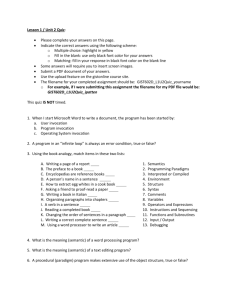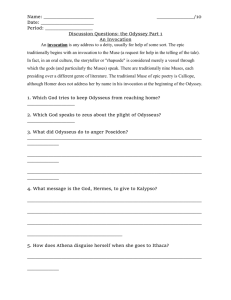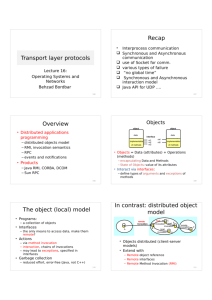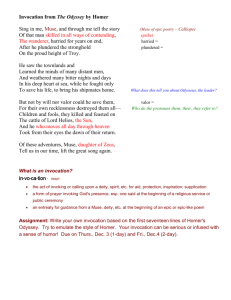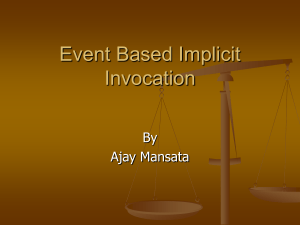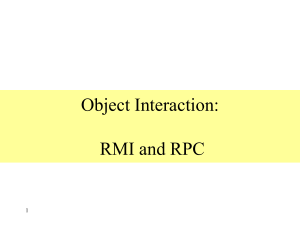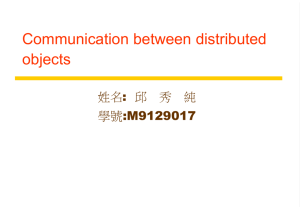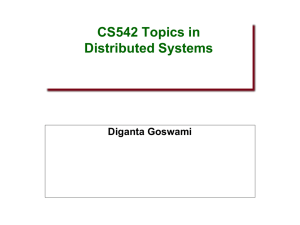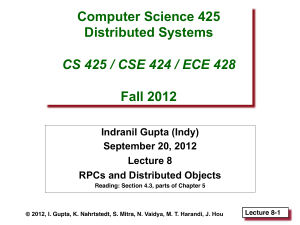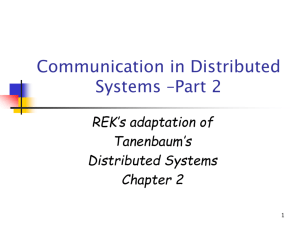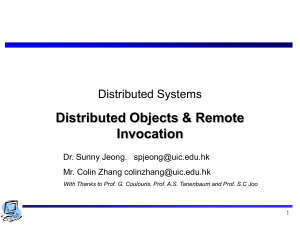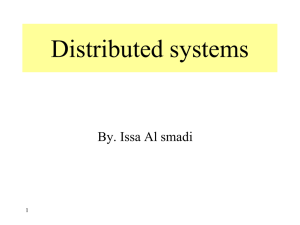DSch5_-_ALL
advertisement
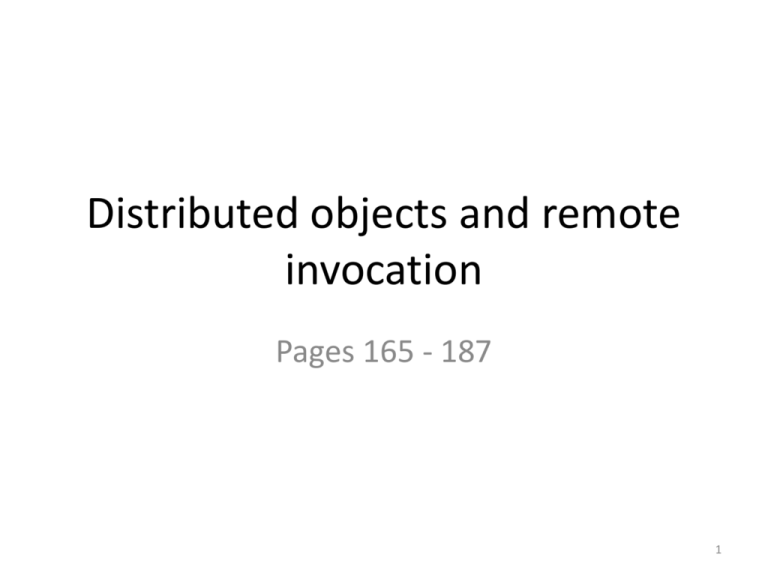
Distributed objects and remote
invocation
Pages 165 - 187
1
Objectives
• Models (RPC, RMI, ……)
• Interface – remote and service.
• Communications between objects - Remote
method invocation.
3
General models
• Remote procedure call model (RPC)
• allows client programs to call procedures in server
programs running in separate processes and
computers
• Remote method invocation (RMI)
• allows an object living in one process to invoke
methods of an object living in another process
• Middelware
• software that provides a programming model above
the basic building blocks of processes and message
passing
4
Middleware layers
Applications
RMI, RPC and events
Request reply protocol
External data representation
Middleware
layers
Operating System
local
remote
invocation
A
B
C
E
invocation local
invocation
local
invocation
D
Remote and local method invocations
remote
invocation
F
5
Middleware
• Location transparency
• Communication protocols
• Computer hardware
• O.S.
6
Interface
remoteobject
remote
interface
{
Data
m1
m2
m3
implementation
of methods
m4
m5
m6
• Interface - module (data, procedure) in general
• Interface – module in D.S. (input, output)
7
Remote interface and Service
interface
• Objects - each object has a remote object reference and a
remote interface
• Service interface - client- server model.
•
remoteobject
remote
interface
{
Data
m1
m2
m3
implementation
of methods
m4
m5
m6
8
Communications between D. objects
• Object model – reference, interface, actions,
exception, garbage collection.
• Distributed object – program is partitioned,
objects are logically partitioned
Distribution,
9
Distributed object model
local
remote
E
invocation local
invocation
invocation
A
C
B
remote
invocation
F
local
invocation
D
• reference, interface, actions, exception,
garbage collection.
10
Design issues for RMI
• Invocation semantics
Fault tolerance measures
Retransmit request
message
Duplicate
filtering
Invocation
semantics
Re-execute procedure
or retransmit reply
No
Not applicable
Not applicable
Maybe
Yes
No
Re-execute procedure
At-least-once
Yes
Yes
Retransmit reply
At-most-once
11
Design issues for RMI (cont’d)
• Exactly once semantics
• every method is executed exactly once
• At-least-once semantics
• the invoker receives: either a result (method executed
at least once) or an exception (no result received)
• Transparency
• remote calls look like local ones
12
Home work Figure 5.6
server
client
object Aproxy for B
Request
skeleton
& dispatcher
for B’s class
remote
object B
Reply
Remote Communication
reference module module
servant
CommunicationRemote reference
module
module
13
Implementation of RMI
• Communication module
• Request-Reply protocol, client-server model
• Remote reference module
• Responsible for translating between local and remote
object references and creating remote object
references
14
Implementation for RMI
• The RMI software (self study)
• Proxy: makes remote method invocation transparent to
the invoker by behaving like a local object, forwards a
message to a remote object
• Dispatcher: receives the Request message, chooses the
appropriate method in the skeleton and passes on the
Request message
• Skeleton: the class of a remote object has a skeleton which
implements the methods in the remote interfaces.
Unmarshals the arguments in the Request message,
invokes the corresponding method in the remote object.
Then waits for invocation to complete and marshals the
result in a Reply message
15
Remote procedure call
client process
server process
Request
client stub
procedure
client
program
Communication
module
Reply
server stub
procedure
Communication
dispatcher
module
service
procedure
16
